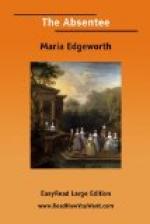Thus ended certain hopes; for Mrs. Petito had conceived that her diplomacy might be turned to account; that in her character of an ambassadress, as Lady Dashfort’s double, by the aid of Iceland moss in chocolate, flattery properly administered; that, by bearing with all her dear Mr. Reynolds’s ODDNESSES and ROUGHNESES, she might in time—that is to say, before he made a new will become his dear Mrs. Petito; or (for stranger things have happened and do happen every day) his dear Mrs. Reynolds! Mrs. Petito, however, was good at a retreat; and she flattered herself that at least nothing of this underplot had appeared; and at all events she secured by her services in this embassy, the long-looked-for object of her ambition, Lady Dashfort’s scarlet velvet gown—’not yet a thread the worse for the wear!’ One cordial look at this comforted her for the loss of her expected OCTOGENAIRE; and she proceeded to discomfit her lady, by repeating the message with which strange old Mr. Reynolds had charged her. So ended all Lady Dashfort’s hopes of his fortune.
Since the death of his youngest son, she had been indefatigable in her attentions, and sanguine in her hopes; the disappointment affected both her interest and her pride, as an INTRIGANTE. It was necessary, however, to keep her feelings to herself; for if Heathcock should hear anything of the matter before the articles were signed, he might ’be off!’—so she put him and Lady Isabel into her coach directly—drove to Gray’s, to make sure at all events of the jewels.
In the meantime Count O’Halloran and Lord Colambre, delighted with the result of their visit, took leave of Mr. Reynolds, after having arranged the journey, and appointed the hour for setting off the next day. Lord Colambre proposed to call upon Mr. Reynolds in the evening, and introduce his father, Lord Clonbrony; but Mr. Reynolds said—
’No, no! I’m not ceremonious. I have given you proofs enough of that, I think, in the short time we’ve been already acquainted. Time enough to introduce your father to me when we are in a carriage, going our journey; then we can talk, and get acquainted; but merely to come this evening in a hurry, and say, “Lord Clonbrony, Mr. Reynolds;—Mr. Reynolds, Lord Clonbrony,” and then bob our two heads at one another, and scrape one foot back, and away!—where’s the use of that nonsense at my time of life, or at any time of life? No, no! we have enough to do without that, I daresay.—Good morning to you, Count O’Halloran! I thank you heartily. From the first moment I saw you, I liked you; lucky too that you brought your dog with you! ’Twas Hannibal made me first let you in; I saw him over the top of the blind.—Hannibal, my good fellow! I’m more obliged to you than you can guess.’
‘So are we all,’ said Lord Colambre.
Hannibal was well patted, and then they parted. In returning home they met Sir James Brooke.
‘I told you,’ said Sir James, ’I should be in London almost as soon as you. Have you found old Reynolds!’




